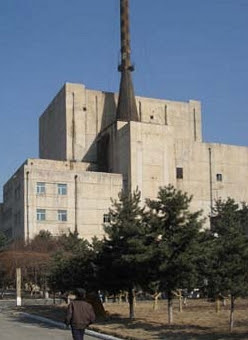 |
| Yongbyon Nuclear Scientific Research Center |
For weeks, North Korea and the West have been engaged in a
largely symbolic ratcheting up of tensions.
But Pyonyang's announcement on April 2 that it will restart
its Yongbyon nuclear reactor, closed since 2007, goes far beyond its recent
declaration that it is in a "state of war" with Seoul or its
retargeting of missiles toward U.S. bases.
That is because restarting Yongbyon reactivates North
Korea's ability to produce nuclear weapons -- something the West once thought
was largely contained.
Nuclear experts say that currently North Korea is assumed to
have just six to eight nuclear weapons. They are assumed to be made of
plutonium extracted from spent fuel rods at the Soviet-era Yongbyon research
reactor before it was closed in 2007 under a disarmament-for-aid deal with the
West.
That deal later fell apart amid U.S. suspicions that
Pyongyang was not fully disclosing all of its nuclear activities, including
further plutonium extraction and the construction of a clandestine uranium-enrichment
facility.
It is still unknown what kind of nuclear device North Korea
tested in February -- the event that sparked the current crisis. But, according
to Paul Rogers, a nuclear expert at Bradford University in England, there is
some speculation that it was made of secretly enriched uranium.
If this is the case, Pyongyang's decision now to openly
restart the reactor may suggest it still feels a need to produce more powerful
plutonium weapons as well.
"Enriched uranium in some ways produces rather cruder
weapons, so the decision to restart the nuclear reactor is really quite
significant," Rogers says. "It does indicate that North Korea now
wants to build a more sizable and potentially more useable nuclear
arsenal."
Reactor In A 'State
Of Disarray'
Plutonium bombs are more powerful than enriched-uranium
bombs and easier to miniaturize into warheads. North Korea already has an
active missile development and testing program, but is not yet believed to have
a way to deliver nuclear weapons other than by airplane.
Just how quickly North Korea can start its Yongbyon reactor
is uncertain.
Shannon Kile, a nuclear expert at the Sweden-based Stockholm
International Peace Research Institute, maintains that the reactor was
deliberately disabled under the aid-for-disarmament deal.
"I am very skeptical whether they are going to be able
to [reactivate the reactor]," he says. "The last IAEA (International
Atomic Energy Agency) visit there in 2009 indicated the place was a complete
shambles. [The North Koreans]blew up the cooling tower in 2008 and by all
accounts the reactor complex, the plutonium production reactor, is in a state
of disarray. It is not clear that it can be repaired."
Kile suggests that when Pyongyang announced it would restart
the Yongbyon reactor, it most likely meant it will restart other, associated
facilities at the site.
That includes a plutonium-separation facility which could be
revived to process any remaining stockpile of plutonium that Pyongyang has.
It also includes a new light-water reactor that is under
construction and would create plutonium among its byproducts.
In addition to these plutonium facilities, Kile believes
Pyongyang will continue to focus on developing designs for smaller, more
compact, enriched-uranium weapons that could be carried by ballistic missiles.
As Pyongyang ramps up the stakes in its current crisis with
Seoul and Washington, there is much debate over its motives.
Many analysts believe that North Korea was infuriated by the
latest round of UN sanctions placed on it in the wake of its February nuclear
test.
A New Leader Earning
His Spurs?
But the timing of the crisis also suggests it may serve the
needs of North Korea's new young leader, Kim Jong Un, to mobilize support among
the country's military elite. Kim, aged 30, was declared supreme leader
following the death of his father Kim Jong Il in late 2011 and was not
prominent before that time.
"A great deal of this is about Kim Jong Un's need to
prove himself," says Aidan Foster-Carter, a Korea expert at Leeds
University in England. "He has only been in power for a little over a
year. He is untried; he had all too little time to prepare, unlike his late
father Kim John Il, who was being groomed for the job for about 20 years."
There also has been speculation that Pyongyang may use its
revived nuclear program to one day negotiate a new aid-for-disarmament deal
with the West.
But Kile believes that restarting Yongbyon now, after the
previous deal broke down, suggests that Pyongyang has made up its mind to
become a bigger nuclear power.
"It seems to me North Korea is determined to move ahead
with its nuclear arsenal," he says. "They are going to improve it
both in terms of numbers but also in terms of the types of weapons they have at
their disposal and I don't think that they are going to be willing to back down
from that for any sort of international humanitarian assistance."
North Korea, despite its powerful military, is one of the
world's poorest countries and has long received various levels of UN food
assistance to protect its population from starvation.
Copyright (c) 2013. RFE/RL, Inc. Reprinted with the permission of Radio Free Europe/Radio Liberty, 1201 Connecticut Ave., N.W. Washington DC 20036.


